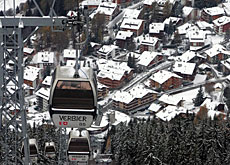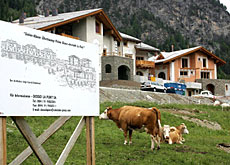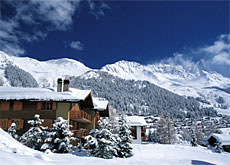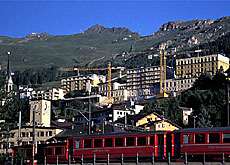Foreigners banned from buying homes in Verbier

Foreigners have been barred for a year from buying holiday homes in the top Swiss ski resort of Verbier in an effort to ease the pressure on lengthy waiting lists.
The decision, imposed by the government of the southern canton of Valais, has infuriated local officials who claim the move will send buyers elsewhere.
Seven communes – all home to mountain resorts – in canton Valais have been hit by a temporary freeze on the sale of holiday homes to foreigners.
Announcing the decision, canton Valais finance director Jean-Michel Cina said “emergency measures” were needed because of a backlog of almost 1,000 sales.
Strict rules laid down by a federal law known as the Lex Koller limit the number of holiday homes that can be bought by foreigners, with cantons awarded an annual quota. This is fixed at 310 units for Valais.
In one commune there is now a six-year delay for sales to go through. All seven municipalities hit by the ban have waiting lists of at least three and a half years.
Defending the move, the Valais authorities said they had acted to protect buyers from “legal insecurity” during the wait for sales to be completed.
Under Swiss law, a buyer who has exchanged contracts with a vendor does not become the rightful owner of a property until the sale has been recorded in the land registry.
Over the past two years, the number of deals awaiting registration in Valais has mushroomed from 200 to almost 1,000 because of the quota system.
Long delays
Cina added that he expected the communes concerned to draw up their own measures to address the problem in the long term.
But Christophe Dumoulin, president of the commune of Bagnes, which includes Verbier, says the seven municipalities are being unfairly penalised.
“What’s going to happen is buyers will go elsewhere. Instead of Verbier, they will now choose Villars or another ski resort. This is discrimination,” he told Le Temps newspaper.
The ban is doubly infuriating for the communes, as the Swiss government has signalled its intention to abolish the Lex Koller. The law was introduced in 1985 to prevent foreigners establishing a “stranglehold” in some areas and sets an annual national sales quota of 1,400 units.
Property boom
Dumoulin said the cantonal authorities had also missed the fact that it wasn’t just foreigners who were driving the property boom.
He claimed that both Swiss nationals and foreigners resident in Switzerland, who are not covered by the Lex Koller, were also in on the act.
André Guinnard, director of Verbier-based Guinnard Real Estate, said officials and businesses were still trying to assess the consequences of the ban but he warned that they were bound to be serious.
“Forty-six per cent of my clients are British so I am really going to be affected by this,” he told swissinfo. “This decision is very bad for the image of Verbier and we are very worried about the situation.”
According to Guinnard, the area of Martigny-Verbier is allowed an annual quota to sell 50 units and has a three-and-a-half-year waiting list.
Joseph Dayer, president of the commune of Hérémence, was equally dismissive. He described the canton’s decision as arbitrary, adding that the situation had been badly handled.
swissinfo, Adam Beaumont with agencies
The seven Valais communes hit with the ban are: Bagnes (Verbier), Grimentz, Hérémence, Nendaz, Riddes, Val d’Illiez and Veysonnaz.
There are 153 communes in Valais.
Communes such as Zermatt and Saas-Fee are not covered by the ban.
According to a report by Credit Suisse Economic Research in 2005, there are around 419,000 second homes (238,000) and vacation homes (181,000) in Switzerland.
Since 1985 a law known as the Lex Friedrich (later Lex Koller) restricts the acquisition of second homes and vacation homes in Switzerland by foreign nationals.
The report found that between 1996 and 2004, a total of 12,150 transfers of ownership to foreign nationals were authorised. This corresponds to around 10% of the housing stock expansion in Switzerland over that period.

In compliance with the JTI standards
More: SWI swissinfo.ch certified by the Journalism Trust Initiative



You can find an overview of ongoing debates with our journalists here. Please join us!
If you want to start a conversation about a topic raised in this article or want to report factual errors, email us at english@swissinfo.ch.